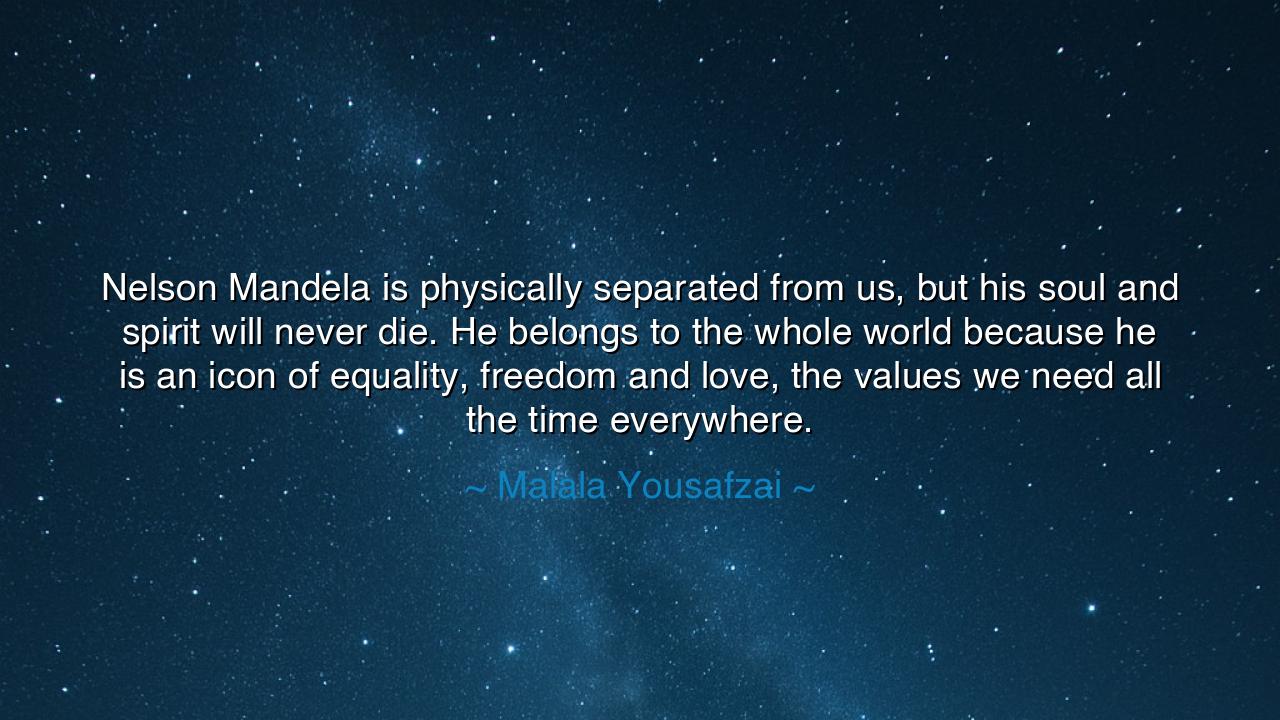
Nelson Mandela is physically separated from us, but his soul and
Nelson Mandela is physically separated from us, but his soul and spirit will never die. He belongs to the whole world because he is an icon of equality, freedom and love, the values we need all the time everywhere.






The words of Malala Yousafzai, “Nelson Mandela is physically separated from us, but his soul and spirit will never die. He belongs to the whole world because he is an icon of equality, freedom and love, the values we need all the time everywhere,” rise like a hymn of remembrance and reverence. In her voice echoes the grief of a generation that lost a great man — and yet, within that grief, the eternal flame of hope. She reminds us that death does not silence the righteous, for their spirit, once awakened in the hearts of humankind, becomes immortal. Through her words, Mandela transcends the boundaries of time and geography, becoming a universal ancestor — a teacher whose life continues to instruct the living.
To understand the depth of this tribute, one must first understand Nelson Mandela’s journey. Born in a land torn by the cruelty of apartheid, he rose not through privilege, but through conviction. Imprisoned for twenty-seven years, he endured humiliation, solitude, and suffering — yet never surrendered his belief in equality, freedom, and love. His body was confined, but his spirit remained vast and untamed. When he emerged from prison, he did not call for vengeance, but for reconciliation; not for power, but for unity. Such men do not die when their hearts stop beating — they live on in the conscience of the world.
Malala, a child of another land and another struggle, recognized in Mandela a reflection of her own path. She too faced violence for daring to speak the truth, for demanding freedom of education and dignity for women. Thus, her words carry not only admiration, but kinship. She speaks as one torchbearer to another — acknowledging that the light Mandela carried through the darkness of oppression is the same light she seeks to carry forward. In this sense, the spirit of Mandela is not bound to South Africa; it breathes in every act of courage, every voice that rises against tyranny, every heart that believes in peace stronger than hate.
The ancients believed that the souls of the righteous become immortal guardians of mankind — that when great souls die, their virtues scatter like seeds, growing anew wherever justice is needed. So it is with Mandela. His prison cell has become a shrine to endurance; his forgiveness, a scripture for the weary; his humility, a crown more radiant than any king’s. Through Malala’s words, we see the continuation of an ancient truth: that spirit outlives the body, and those who live for others never truly perish.
In every age, there are figures who embody the eternal struggle for freedom and equality — Moses who led his people from bondage, Gandhi who wielded peace against empire, Martin Luther King Jr. who dreamed of brotherhood in a divided land. Mandela stands among them, not as a saint untouched by flaw, but as a human perfected through suffering. His greatness was not in his power, but in his capacity to forgive, to rebuild what hatred had destroyed. It is this power — the power of love as resistance — that Malala calls the world to remember.
But her words carry also a warning: that these values — equality, freedom, love — are not relics to be admired, but duties to be lived. The world still burns with injustice, nations still divide their children by race, wealth, or creed, and hearts still harden in the name of fear. To say Mandela’s spirit “will never die” is to accept the burden of keeping it alive. Every generation must renew his work, or his sacrifice fades into myth. The soul of Mandela endures only through the actions of those who walk his path.
Therefore, let this be the teaching to future generations: Do not worship the memory of heroes — embody it. Speak for the voiceless, even when it costs you peace. Love your enemies, even when the world mocks your mercy. Seek justice not through anger, but through courage. For in doing so, you honor the immortality of Mandela’s spirit, and the faith of Malala’s words. The legacy of such souls is not carved in marble, but written upon the living hearts of those who continue their mission.
Thus, when Malala declares that Mandela belongs to the whole world, she speaks a timeless truth: that the spirit of freedom is not owned by any nation, nor bound to any race. It flows through humanity itself, eternal and indivisible. And when we act in kindness, when we defend the oppressed, when we choose love over vengeance — then Mandela lives again, and his soul walks among us. For such men are never truly gone. They have merely stepped beyond the horizon, watching, waiting, urging us to carry the light forward into the dawn.






AAdministratorAdministrator
Welcome, honored guests. Please leave a comment, we will respond soon